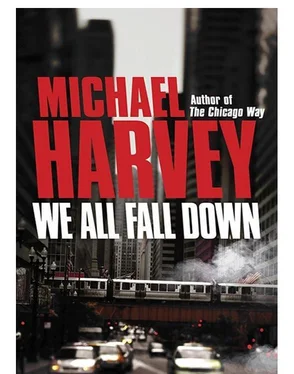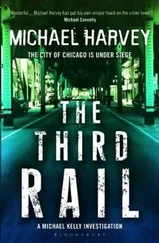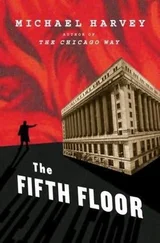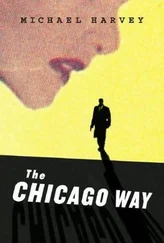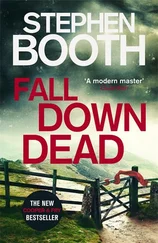Michael Harvey - We All Fall Down
Здесь есть возможность читать онлайн «Michael Harvey - We All Fall Down» весь текст электронной книги совершенно бесплатно (целиком полную версию без сокращений). В некоторых случаях можно слушать аудио, скачать через торрент в формате fb2 и присутствует краткое содержание. Жанр: Полицейский детектив, на английском языке. Описание произведения, (предисловие) а так же отзывы посетителей доступны на портале библиотеки ЛибКат.
- Название:We All Fall Down
- Автор:
- Жанр:
- Год:неизвестен
- ISBN:нет данных
- Рейтинг книги:5 / 5. Голосов: 1
-
Избранное:Добавить в избранное
- Отзывы:
-
Ваша оценка:
- 100
- 1
- 2
- 3
- 4
- 5
We All Fall Down: краткое содержание, описание и аннотация
Предлагаем к чтению аннотацию, описание, краткое содержание или предисловие (зависит от того, что написал сам автор книги «We All Fall Down»). Если вы не нашли необходимую информацию о книге — напишите в комментариях, мы постараемся отыскать её.
We All Fall Down — читать онлайн бесплатно полную книгу (весь текст) целиком
Ниже представлен текст книги, разбитый по страницам. Система сохранения места последней прочитанной страницы, позволяет с удобством читать онлайн бесплатно книгу «We All Fall Down», без необходимости каждый раз заново искать на чём Вы остановились. Поставьте закладку, и сможете в любой момент перейти на страницу, на которой закончили чтение.
Интервал:
Закладка:
“Shouldn’t we have protective suits on?” I said.
“The level-four facility is in another building,” Brazile said. “We’re fine here. Molly?”
“I’m heading down now to check on the gear.” Brazile’s associate spoke in the easy style of a person who knew her duties and knew the routine. “Do you want me to call Danielson?”
“I sent him the results,” Brazile said. “Why don’t you follow up? Tell him I’ll call in a bit.”
Molly plugged in the last of three laptops from the field and left. Brazile sat down at one of the pods and powered up a computer. An overhead AC vent ran an icy hand down my back.
“Do you mind if we talk as I work?” Brazile’s question was less a question and more a statement of fact. I took a seat and watched her long fingers type and click. She didn’t wear a wedding ring. In her line of work, why would she? And why should I care?
“I appreciate your help this morning,” Brazile said. “Didn’t need it, but you went down with us, and that took a certain amount of nerve.”
“Thank you.”
She stopped typing and posed for a polite smile. “Thing is, I’m not sure that what we do here will be accessible for you.”
“Is that a nice way of telling me I’m dumb?”
“Hardly.”
“Treat me like a first responder.”
“Excuse me?”
“A first responder. Cop, fireman, security at O’Hare. What do they need to know? Or are they all just dead men in your eyes?”
The typing stopped a second time. So did the clicking.
“There are no tricks when it comes to dealing with a bioweapon, Mr. Kelly. No Jack Bauer heroics. Your best bet is to leave the device alone and wait until someone qualified shows up.”
“You assume Chicago cops even know what a ‘device’ looks like. They don’t.”
“And if I teach you a couple of things, maybe you’ll pass it along?”
“Can’t hurt.”
“Fair enough.” Brazile pushed back from her workstation. “I can give you ten minutes. Where would you like to start?”
“How about the term ‘black biology’?”
“It refers to, among other things, rogue labs that use recombinant DNA technology to enhance existing pathogens or create new ones. It might mean modifying an existing strain of anthrax or grafting a filovirus such as ebola onto a common flu virus. It might be a creation that is entirely synthetic.”
“Synthetic?”
“Scientists work with something called BioBricks-very specific strings of DNA with defined functions. An example might be a BioBrick that represents the molecular expression of the lethal properties of bubonic plague. Using genetic engineering techniques, we’re now able to isolate these BioBrick parts and sequence them together. Theoretically, anyway, making it possible to create new organisms. Even fully synthetic ones.
“There are roughly twenty thousand unlicensed labs in the world capable of such work. All it takes is three or four scientists with the right tools and maybe ten, fifteen million dollars. You can create what we call a superbug. No known cure. No vaccine. No stopping it.” A shrug. “That’s black biology, in a nutshell.”
“And what do we have on our side?”
Brazile ran a finger down the side of her flat screen. “We work in an emerging field of study called bioinformatics-essentially, the application of statistics and high-powered computers to the field of molecular biology. We’re constantly loading DNA sequences into our databanks, crunching base pairs and generating computer models of new pathogens that might be created in a rogue lab. Then we try to replicate some of those organisms in our facility here. The hope is if a black biology threat surfaces, we have more possible genetic strings to compare it against.”
“If?”
“Actually, it’s more like when.” Brazile’s screen beeped. She opened an e-mail, read it, and responded.
“So you will run the DNA signature of the stuff you found today against your library?” I said.
“Exactly. I’m betting we’ll find it to be an old anthrax strain they used at Detrick back in the day.”
“You can get that specific?”
“As I said, every lab has its own signature, its own mix of materials and processes it uses to engineer pathogens. I can look at just about anything and come away with a pretty good idea of where it was worked on, by whom, and when.”
“And if today’s strain didn’t come from Detrick?”
“It did.”
“Humor me.”
“If the pathogen came up as an entirely new virus or bacterial strain, we would immediately look for its closest cousin.” Brazile pulled up a fresh screen of text. “This is our library of vaccines. We have thousands of strands, each tuned precisely to an existing pathogen, or designed to counter imaginary pathogens the computer has dreamed up. When a threat emerges, we put the vaccine blueprint into a production line and start churning out the vaccine itself.
“What you’re looking at, essentially, is a molecular arms race. Us against the black biologists. A virus mutates. A new strain of bacteria appears. We adjust. It changes again. We respond. The computers allow us an unprecedented agility. The ability to react much faster than we ever thought possible. Hopefully, that will save lives.” Brazile waved her hands around the empty lab. “As you said, next-generation CSI.”
“Except CSI slips people into body bags one at a time. You harvest them a dozen at a time.”
“You don’t want to know the numbers, Mr. Kelly.” Brazile got up from her chair and walked across the lab. She came back with a thin black binder. “We do care about first responders. And we do think about them. This is a sort of guidebook we’ve prepared for a layperson. The first three sections lay out the basics of bioinformatics.”
The door behind us clicked, and Molly Carrolton walked back in.
“I started processing the aerosol packs. We should have some results in an hour or two.” Molly’s PDA beeped. She plucked it off her belt and checked the screen. “It’s Danielson.”
A phone rang. Molly put it on speaker. The man from Homeland didn’t wait for any hellos.
“Is Kelly there?”
“Right here,” I said.
“Is the mayor still down there?”
I hadn’t seen Wilson but wasn’t surprised he was hanging around.
“He was in with Stoddard,” Molly said. “But I think they’re gone.”
“Okay. Kelly, I need to wrap up a few things with the scientists.”
“And I’d like to go home.”
There was a pause. I listened for other voices on the line but heard nothing.
“Stay available on your cell for another hour or two,” Danielson said. “After that, we can shut it down.”
“Fine.” I waved to the two scientists and flipped a solo digit in the general direction of our friend at the other end of the line. Then I left.
CHAPTER 14
I walked out of CDA, gulped in a lungful of air, and thought about a smoke. After my lesson in black biology, a little lung cancer didn’t seem so bad. At the short end of the block, a car began to roll. The driver’s-side window slid halfway down as the car eased to a stop.
“What are you doing here?” I said.
Rita Alvarez blinked twice. “I could ask you the same question. You got time for coffee?”
“Why not?”
I hopped in the front seat. We drove three blocks to a coffee shop called the Daily Grind. Everything was organic and good for you, even the caffeine. I got myself a regular, black, pushed a pile of books off the table, and shooed away three of the owner’s cats. Rita ordered herbal tea.
“What’s with all the cats?” I said.
Rita shrugged and picked one up, long and black, one eye green, the other missing.
Читать дальшеИнтервал:
Закладка:
Похожие книги на «We All Fall Down»
Представляем Вашему вниманию похожие книги на «We All Fall Down» списком для выбора. Мы отобрали схожую по названию и смыслу литературу в надежде предоставить читателям больше вариантов отыскать новые, интересные, ещё непрочитанные произведения.
Обсуждение, отзывы о книге «We All Fall Down» и просто собственные мнения читателей. Оставьте ваши комментарии, напишите, что Вы думаете о произведении, его смысле или главных героях. Укажите что конкретно понравилось, а что нет, и почему Вы так считаете.
